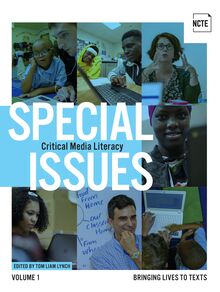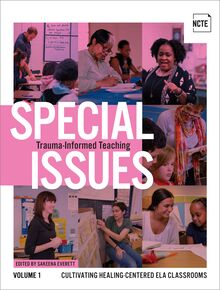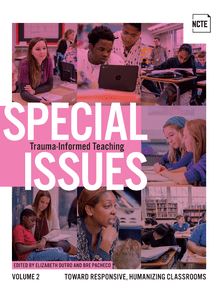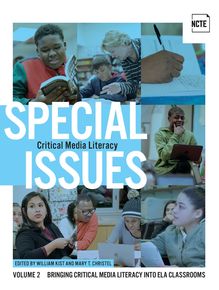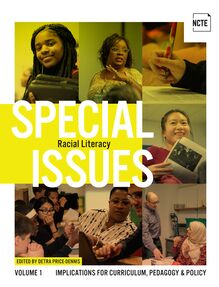-
 Univers
Univers
-
 Ebooks
Ebooks
-
 Livres audio
Livres audio
-
 Presse
Presse
-
 Podcasts
Podcasts
-
 BD
BD
-
 Documents
Documents
-
- Cours
- Révisions
- Ressources pédagogiques
- Sciences de l’éducation
- Manuels scolaires
- Langues
- Travaux de classe
- Annales de BEP
- Etudes supérieures
- Maternelle et primaire
- Fiches de lecture
- Orientation scolaire
- Méthodologie
- Corrigés de devoir
- Annales d’examens et concours
- Annales du bac
- Annales du brevet
- Rapports de stage
La lecture à portée de main
Vous pourrez modifier la taille du texte de cet ouvrage
Découvre YouScribe en t'inscrivant gratuitement
Je m'inscrisSpecial Issues, Volume 2: Racial Literacy , livre ebook
Découvre YouScribe en t'inscrivant gratuitement
Je m'inscrisEn savoir plus
Vous pourrez modifier la taille du texte de cet ouvrage
En savoir plus

Description
07 Dedication
AYANNA F. BROWN
08 What Constitutes Literacy in a Society Organized by Race? Racial Literacy as an Intellectual Imperative
AYANNA F. BROWN
18 From Talking about Race to Pursuing Freedom: An Autoethnography of a Black Educator
DANEELL D. MOORE
23 Developing Racial Literacy in a Community College First-Year Composition (FYC) Course
JORDAN BELL
35 The Making of Abolitionist Classroom Community: A Call for Critical Collective Practices in the English Classroom
KIA TURNER
43 Promoting Racial Literacy through Exposure to Critical Texts
BERNNADETTE BEST-GREEN
50 “I’m Gonna Have to Learn More about That!”: Using Thinking Routines and Text Sets to Foster Racial Consciousness
MICHELLE STREED
59 Racial Literacy in the Elementary Classroom
ANNIE DALY
68 Trading Races: Using Play to Ignite Racial Literacy
JALESA D. PARKS
76 Burning Fires: Destruction and Creation in a Multicultural Literature Classroom
HANNAH EDBER
87 Learning to Name and Disrupt Racism: Supporting Latinx Students’ Racial Literacy in Ethnic Studies Classrooms
ARTURO NEVÁREZ
95 Racial Literacy to Address Racial Ill-literacy among International Students
NASIBA NOROVA
103 Decentering Whiteness and “Native” English Speakerness: Hands-On Strategies in College English Classrooms
QIANQIAN ZHANG-WU
108 Re-Centering Community and Sociopolitical Context in Racial Literacy Discourse in Education
JEROME E. MORRIS
113 Racial Literacy Considerations for Instruction
AYANNA F. BROWN
Sujets
Informations
| Publié par | National Council of Teachers of English (NCTE) |
| Date de parution | 15 novembre 2022 |
| Nombre de lectures | 0 |
| EAN13 | 9780814145029 |
| Langue | English |
Informations légales : prix de location à la page 0,1500€. Cette information est donnée uniquement à titre indicatif conformément à la législation en vigueur.
Extrait
TITLES IN THE SERIES
CRITICAL MEDIA LITERACY
Vol. 1: Bringing Lives to Texts
Vol. 2: Bringing Critical Media Literacy into ELA Classrooms
RACIAL LITERACY
Vol. 1: Implications for Curriculum, Pedagogy, & Policy
Vol. 2: Sociopolitical and Sociocultural Contexts for Youth
TRAUMA-INFORMED TEACHING
Vol. 1: Cultivating Healing-Centered Classrooms
Vol. 2: Toward Responsive, Humanizing Classrooms
Editor: Ayanna F. Brown
Series editor: James Sitar
Cover and interior design: Ash Goodwin
Cover images: Marvin Young
Typesetter: Jim Gallagher
ISBN: 978-0-8141-4500-5
eISBN: 978-0-8141-4502-9
© 2022 by the National Council of Teachers of English.
All rights reserved. No part of this publication may be reproduced or transmitted in any form or by any means, electronic or mechanical, including photocopy, or any information storage and retrieval system, without permission from the copyright holder. Printed in the United States of America.
It is the policy of NCTE in its journals and other publications to provide a forum for the open discussion of ideas concerning the content and the teaching of English and the language arts. Publicity accorded to any particular point of view does not imply endorsement by the Executive Committee, the Board of Directors, or the membership at large, except in announcements of policy, where such endorsement is clearly specified.
NCTE provides equal employment opportunity to all staff members and applicants for employment without regard to race, color, religion, sex, national origin, age, physical, mental or perceived handicap/disability, sexual orientation including gender identity or expression, ancestry, genetic information, marital status, military status, unfavorable discharge from military service, pregnancy, citizenship status, personal appearance, matriculation or political affiliation, or any other protected status under applicable federal, state, and local laws.
Every effort has been made to provide current URLs and email addresses, but, because of the rapidly changing nature of the web, some sites and addresses may no longer be accessible.
Library of Congress Cataloging-in-Publication Data applied for.
NCTE
340 N. Neil Street, Suite 104 | Champaign, IL 61820
www.ncte.org
SOCIOPOLITICAL AND SOCIOCULTURAL CONTEXTS FOR YOUTH
Dedication
AYANNA F. BROWN
What Constitutes Literacy in a Society Organized by Race? Racial Literacy as an Intellectual Imperative
AYANNA F. BROWN
From Talking about Race to Pursuing Freedom: An Autoethnography of a Black Educator
DANEELL D. MOORE
Developing Racial Literacy in a Community College First-Year Composition (FYC) Course
JORDAN BELL
The Making of Abolitionist Classroom Community: A Call for Critical Collective Practices in the English Classroom
KIA TURNER
Promoting Racial Literacy through Exposure to Critical Texts
BERNNADETTE BEST-GREEN
“I'm Gonna Have to Learn More about That!”: Using Thinking Routines and Text Sets to Foster Racial Consciousness
MICHELLE STREED
Racial Literacy in the Elementary Classroom
ANNIE DALY
Trading Races: Using Play to Ignite Racial Literacy
JALESA D. PARKS
Burning Fires: Destruction and Creation in a Multicultural Literature Classroom
HANNAH EDBER
Learning to Name and Disrupt Racism: Supporting Latinx Students' Racial Literacy in Ethnic Studies Classrooms
ARTURO NEVÁREZ
Racial Literacy to Address Racial Ill-literacy among International Students
NASIBA NOROVA
Decentering Whiteness and “Native” English Speakerness: Hands-On Strategies in College English Classrooms
QIANQIAN ZHANG-WU
Re-Centering Community and Sociopolitical Context in Racial Literacy Discourse in Education
JEROME E. MORRIS
Racial Literacy Considerations for Instruction
AYANNA F. BROWN
DEDICATION
AYANNA F. BROWN
THE OPPORTUNITY TO BUILD this work is the result of having an amazing community, including my family, friends, scholars, and the National Council of Teachers of English leadership team. Thank you for this space and your grace.
Zawadi and Ezra, you continue to be the delights of my heart. You are all that I need and more than I could have imagined.
On August 14, 1991, I arrived at Tuskegee University. There, I was loved and lifited. I was challenged and excited. There, I grew, at my HBCU, and found my sisters: Trina, Abebi, Wileatha, and Teneka. In 2013, we lost Wileatha, but we have been forever strengthened by and because of her. Wileatha earned a BS in Chemical Engineering from Tuskegee University, and MA in Engineering, Environmental Engineering from the University of Michigan. After working as an engineer for many years, she found her passion in education, teaching secondary students science. Will wrote the following poem when she was sixteen years old, questioning her joy and place in an AP Chemistry class:
AP Chemistry Inventory, September 30, 1989
1 white ceiling w/ white lights
1 white teacher teaching
25 white desktops
1 white floor
2 white lecture boards
21 white students learning
3 brown students
2 white conversations in the back of the class
1 white teacher's white pun
and
BLACK ME
—Wileatha Horton
For your 16 year-old observations
Your young adult analysis
Your wise paradox
Your gracious life
Your languaging race beyond mortality
You, Will.
You will.
You, Will, are and will always be my friend.
And for all of what I have been and have gained over the past 30 years… I dedicate this effort
For sisterhood
For love
For faith
For children
For sunlight
For inspiration
For teaching and learning
For the quiet of the night when I often have time to sigh and write, I will walk peacefully in your thoughts if you promise you will lay a blanket there upon which I can sit and look for you.
—Ayanna Fitima
WHAT CONSTITUTES LITERACY IN A SOCIETY ORGANIZED BY RACE? Racial Literacy as an Intellectual Imperative
AYANNA F. BROWN
This chapter serves as the introduction and the conceptual framing for this volume on racial literacy. Brown questions what constitutes literacy in a society organized by race as an inquiry to deepen the significance for why K–20 learners must develop knowledges that support their abilities to process and ultimately transform racism. “We must elevate developing multiple forms of literacy practices that seek liberation not regardless of or in spite of racism. We must encourage the ability to read, think, discuss, analyze, create, and develop learning experiences that emancipate youth because of race and racism. ” Brown challenges the growing study of racial literacy with three propositions for racial literacy scholarship as a means to delimit terminological ideas from the sociopolitical and sociocultural urgency of building K–20 learning that invests in liberatory pedagogies. Brown's propositions center the need for: 1) interdisciplinary study of content knowledge that establishes relevancy and rigor within and across content areas; 2) opposition to processes, practices, and pedagogies that seek to pacify Black and Brown people; and 3) analytical examination racial discourse.
“What Constitutes Literacy?”
This seemingly rhetorical but frequently asked ques-tion is typically used to locate the complexity within literacy studies. For some, it simply means what does it mean to know and how does one communicate their knowing . For others, it continues to mean how does one acquire information ? And more often than not, considerations for literacy are reduced to simply reading printed text (Alvermann). It is also important to consider that questioning literacy can be a preludial approach to study language and how it functions (Brown and Bloome) within various speech commu-nities. More specifically, the ways in which we use language and for diverse purposes impact how literacy is perceived. April Baker Bell asks, “What is the purpose of language education in our current racial and political context?” (4) The importance of this critical question is rooted in the idea that while public education admits all students across race, class, gender, language and abilities, curricular violence—even in its subtleties—govern the culture of education and teacher practices.
What remains clear in examining the question, “what constitutes literacy?” is the absence of sociocultural or sociopolitical agency—literacy for and defined by whom? The clarifying questions are necessary if we are able to gauge and unveil what Isabel Wilkerson presents as a critical component to the pillars of “caste,” a colonial system of racial domination: “The only way to keep an entire group of sentient beings in an artificially fixed place, beneath all others and beneath their own talents, is with violence and terror, psychological and physical, to preempt resistance before it can be imagined” (151). Literacy when and where and under what circumstances opposes discussions of literacy devoid of place, space, or time. Furthermore, situating literacy in various contexts with analysis of state and national policies positions, both historical and contemporary, demand an unveiling for how the pursuit for literacies can be undermined. An autocratic and monolithic discussion or framing of literacy erases and avoids important factors like socioeconomic status, gender, race, and ability.
Why is this relevant? If we examine literacy in the context of a society, one organized by laws, diverse communities, culture, politics, and forms of expressions, then we can acknowledge the invaluable assertion from New Literacy Studies that has impacted our discussion of literacy and its critical shift to literacies. Brian Street reminds us that this growth is founded upon the “rejection by many writers of the dominant view of literacy as a ‘neutral,' technical skills, and the conceptualization of literacy instead as an ideological practice, implicated in power relations and embedded in specific cultural meanings and practices”(1). Nearly twenty years and within the
-
 Univers
Univers
-
 Ebooks
Ebooks
-
 Livres audio
Livres audio
-
 Presse
Presse
-
 Podcasts
Podcasts
-
 BD
BD
-
 Documents
Documents
-
Jeunesse
-
Littérature
-
Ressources professionnelles
-
Santé et bien-être
-
Savoirs
-
Education
-
Loisirs et hobbies
-
Art, musique et cinéma
-
Actualité et débat de société
-
Jeunesse
-
Littérature
-
Ressources professionnelles
-
Santé et bien-être
-
Savoirs
-
Education
-
Loisirs et hobbies
-
Art, musique et cinéma
-
Actualité et débat de société
-
Actualités
-
Lifestyle
-
Presse jeunesse
-
Presse professionnelle
-
Pratique
-
Presse sportive
-
Presse internationale
-
Culture & Médias
-
Action et Aventures
-
Science-fiction et Fantasy
-
Société
-
Jeunesse
-
Littérature
-
Ressources professionnelles
-
Santé et bien-être
-
Savoirs
-
Education
-
Loisirs et hobbies
-
Art, musique et cinéma
-
Actualité et débat de société
- Cours
- Révisions
- Ressources pédagogiques
- Sciences de l’éducation
- Manuels scolaires
- Langues
- Travaux de classe
- Annales de BEP
- Etudes supérieures
- Maternelle et primaire
- Fiches de lecture
- Orientation scolaire
- Méthodologie
- Corrigés de devoir
- Annales d’examens et concours
- Annales du bac
- Annales du brevet
- Rapports de stage
